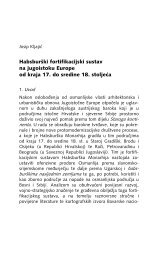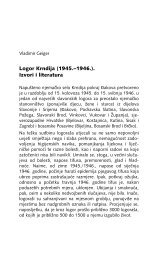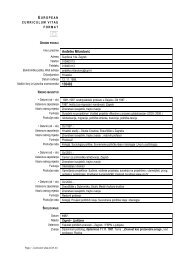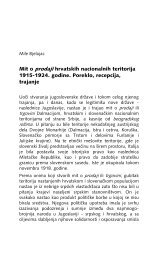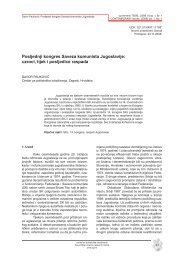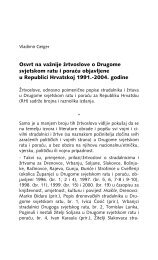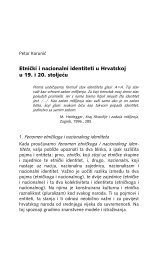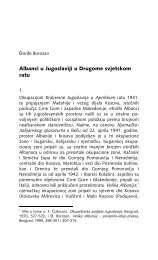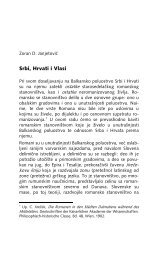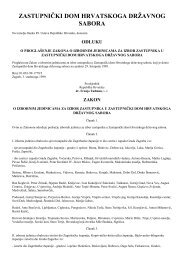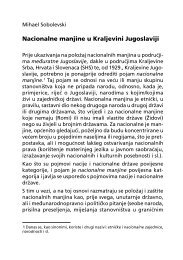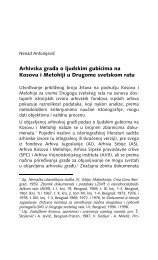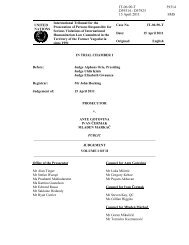ISSN 1847-2397 godište II broj 1 2009. | volume II number 1 2009
ISSN 1847-2397 godište II broj 1 2009. | volume II number 1 2009
ISSN 1847-2397 godište II broj 1 2009. | volume II number 1 2009
- No tags were found...
Create successful ePaper yourself
Turn your PDF publications into a flip-book with our unique Google optimized e-Paper software.
Plamena Pehlivanova: The Decline of Trust in Post-Communist Societiessuvremene TEME, (<strong><strong>2009</strong>.</strong>) God. 2, Br. 1CONTEMPORARY issues, (<strong>2009</strong>) Vol. 2, No. 1more isolated, less trustful and not participating?When we test the WVS section of “Spend leisuretime”, the data shows that Russians and Bulgarianshardly spend any time in formal clubs, organisationsor cultural gatherings. An influentialfactor for these negative results are the opinionsreported by the older generation. Nevertheless,we should a question: why is this so? The marginalstable shows very intriguing results underthe section “Not applicable”. It is interesting tonote that only Bulgaria and Russia show percentageoutcome in this section. The result forBulgaria (46%) and the Russia (23%) shows avery high percentage that shouldn’t be ignored inthis analysis. What does “Not applicable” mean?Does it mean that such organisations are a nonexistingconcept for 46% of the Bulgarians and23% of the Russians? During the communisticregime, the Bulgarian and Russian society wererequired to become members of organisations –such as sports clubs, youth clubs, party organisations,and various professional unions – whichwere controlled by the state. However, with thefall of the regime, these organisations vanishedTaking note of the marginals section under this study, the following is observed:Table 5Marginals for question: “How often do you spend time with people at sport,culture, communal organisations?”Country Not applicable % nBulgaria 46 460China 0,0 0Russian Federation 23,3 583United States 0,0 0World Value Survey (1999)*The marginals section pays attention to the section “Not Applicable” and theresults that follow under the countries of Bulgarian (1999) and Russia (1999).or were modified and altered into new formsadaptable to the new democratic society. It isreasonable to infer that with the disintegration ofthese formal clubs and organisations, the oldergeneration couldn’t adapt with the new forms orwas not well-informed about the emergence ofnew ones. In general, the older generation experiencedinequality from the state (in terms of incomeand pension) and was left in isolation fromthe rapidly emerging new forms of civil life. Thisneglect and seclusion left the elderly with the inabilityto adapt to the tempo of the social modernizations.In these terms, older people in bothcountries might show inadequate responses tosurveys like the one shown above. “Not applicable”,thus proves to be a very important fieldfor further examinations and speculations.Nevertheless, the WVS from 1999 observesa decline of social participation in formalorganisations in Bulgaria, Russia and China. Amore recent study under the European Barometerexamines the changes in the Bulgarian societyafter 2007 and it reports pessimistic outcomesnot very different from the observationsin 1999. “Citizens’ mistrust towards national governments,parliaments and the judiciary has registeredagain, as in previous surveys, its highestlevels, and trust – the lowest scores, in the wholeEurobarometer survey” (Eurobarometer, 2008:5). On the other hand, the above mentionedeconomic inequality and the general influenceof the economic downfall coincides with growingoutgroup distrust in the Bulgarian and Russiansociety. WVS (1999) asks: “Generally speaking,would you say that most people can be trustedor that you need to be very careful in dealing withpeople?” The answers are:centar za politološka istraživanjathe political science research centrewww.cpi.hr41



